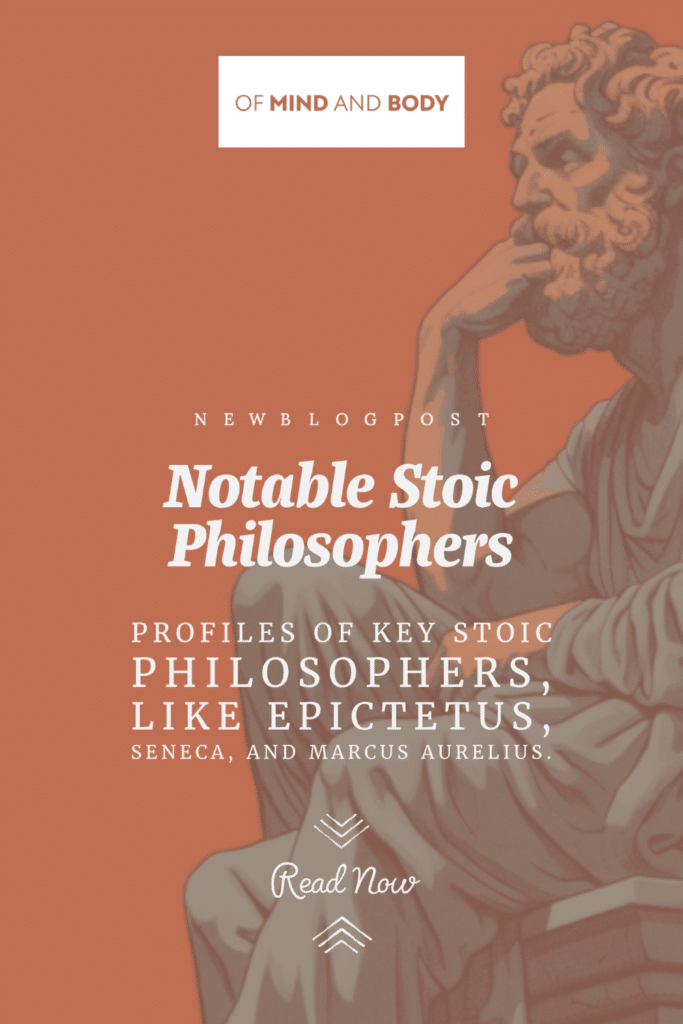
In our previous exploration of Stoicism, we delved into the origins and key principles of this profound philosophy. Now, let’s turn our attention to the individuals who breathed life into these principles—the notable Stoic philosophers Epictetus, Seneca, and Marcus Aurelius. Their teachings, born out of diverse life experiences, offer a rich tapestry of wisdom that continues to guide us today.
Epictetus: The Slave-Turned-Philosopher
Epictetus, born into slavery in the Roman Empire, is a testament to the transformative power of Stoicism. Despite his lowly status, he managed to study philosophy and later gained his freedom. He spent the rest of his life teaching Stoicism in Rome and then in Greece, leaving a lasting legacy.
Epictetus’s teachings, recorded by his student Arrian in the Discourses and the Enchiridion, focus on the dichotomy of control. He emphasised that while we can’t control external events, we can control our reactions to them. One of his most famous quotes encapsulates this principle: “It’s not what happens to you, but how you react to it that matters.”

Seneca: The Stoic Statesman
Seneca the Younger, often simply known as Seneca, was a statesman, a dramatist, and a philosopher. He served as an adviser to Emperor Nero, and his political career was as turbulent as it was influential. Despite his wealth and power, Seneca lived—and ultimately died—by his Stoic beliefs.
Seneca’s writings, including his Moral Letters to Lucilius, offer practical advice on how to live a good life. He explored topics such as anger, tranquillity, and the shortness of life, always emphasising the importance of virtue. His words remind us that “We suffer more often in imagination than in reality.”
Marcus Aurelius: The Philosopher King
Marcus Aurelius, the last of the Five Good Emperors of Rome, is perhaps the most famous Stoic philosopher. Despite his status as emperor, Marcus Aurelius lived a simple life, dedicated to the pursuit of wisdom. His personal notes, known as the Meditations, provide a window into his mind and his commitment to Stoicism.
Marcus Aurelius saw adversity as an opportunity for growth and believed that our character is revealed through our actions. His Meditations abound with insights like, “You have power over your mind—not outside events. Realise this, and you will find strength.”
The Legacy of Stoic Philosophers
The teachings of Epictetus, Seneca, and Marcus Aurelius have transcended time and continue to inspire millions around the world. Their wisdom has permeated various fields, from psychology to leadership, and their words often find their way into motivational speeches, self-help books, and social media quotes.
These philosophers, despite their vastly different backgrounds—a slave, a statesman, an emperor—found common ground in Stoicism. Their lives demonstrate that Stoicism is more than a philosophy; it’s a way of life that can be embraced by anyone, regardless of their circumstances.
Their teachings remind us that while we may not control the world around us, we have the power to control our inner world. They encourage us to focus on what truly matters—our character, our actions, our responses—and to let go of what doesn’t. They teach us to embrace adversity, to learn from it, and to let it strengthen us.

Conclusion
As we journey through the rich terrain of Stoicism, the lives and wisdom of Epictetus, Seneca, and Marcus Aurelius act as our compass. They light up our path, providing a clear vision of what it truly means to embody Stoicism.
Next time, we’ll be diving headfirst into the heart of Stoicism—the dichotomy of control. We’ll unpack how this fundamental principle can be our steady hand, guiding us through life’s inevitable ups and downs with a sense of calm and resilience.
I trust that this deep dive into the lives of these Stoic philosophers has enriched your understanding of Stoicism. But remember, as we journey on, Stoicism isn’t merely a philosophy to understand—it’s a way of life to be lived. So, let’s roll up our sleeves and strive to live out the wisdom these philosophers have passed down to us.




8 Responses